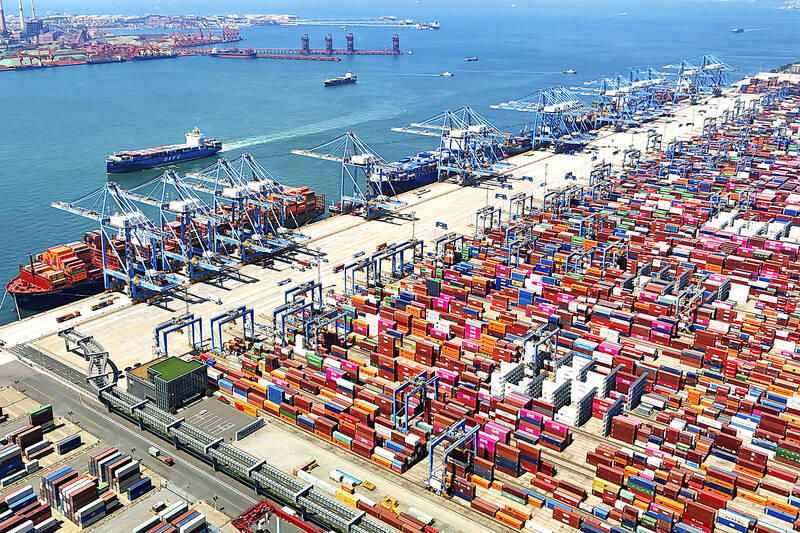China’s export growth surged last month to the fastest since July 2022, extending a months-long boost to the economy that may be jeopardized by Donald Trump’s reelection and his tariff threats.
Exports rose 12.7 percent from a year earlier to US$309 billion, the Chinese General Administration of Customs said yesterday, significantly exceeding any economist’s forecast.
The trade surplus in the month climbed to the third-highest on record, as factories ramped up shipments ahead of Christmas holidays and likely in anticipation of worsening trade tensions.

Photo: Chinatopix via AP
“This may partly be driven by exporters trying to front-load shipments in order to mitigate the damage of a potential trade war next year,” said Zhang Zhiwei (張智威), president and chief economist at Pinpoint Asset Management Ltd (保銀私募基金管理). “I think the economy will improve modestly in the fourth quarter, but the trade war may start in the first quarter of next year. We cannot rely on exports to carry China’s economy.”
The strength in exports — their value grew in all but one of the last 12 months — has helped make up for sluggish domestic demand, but that outpouring of cheap products has also sparked a backlash. In response, the US, South America and Europe, among others, have raised tariff barriers against goods such as steel and electric vehicles.
China yesterday slashed the daily reference rate for its currency to the weakest in almost a year, a sign its central bank is allowing depreciation under the threat of an escalated trade war with the US. A weaker yuan boosts the competitiveness of Chinese exporters.
Last month, exports to the US rose 8.1 percent, the most in three months. Shipments to most markets climbed, with double-digit increases to Asean, the European Union, South Africa and Brazil. Shipments to Russia jumped almost 27 percent, the fastest growth this year.
Trump’s return to the White House will further complicate the outlook. The president-elect has threatened to put tariffs of as much as 60 percent on Chinese goods, a level that Bloomberg Economics predicts will decimate trade between the world’s biggest economies.
Any new barriers would mean China might need to find new markets for the products it currently sells to the US. Last year, Chinese companies shipped US$500 billion in goods to America, accounting for 15 percent of the value of all its exports.
Huang Zichun (黃子春), China economist for Capital Economics, said those levies would hurt China’s export sector, but he expects emerging markets to offset a sizable portion of the loss in demand from the US.
“Their impact would be less significant than many fear – we think they could lower export volumes by around 3 percent – and may not be felt until the second half of 2025,” Huang wrote in a note.

SEEKING CLARITY: Washington should not adopt measures that create uncertainties for ‘existing semiconductor investments,’ TSMC said referring to its US$165 billion in the US Taiwan Semiconductor Manufacturing Co (TSMC, 台積電) told the US that any future tariffs on Taiwanese semiconductors could reduce demand for chips and derail its pledge to increase its investment in Arizona. “New import restrictions could jeopardize current US leadership in the competitive technology industry and create uncertainties for many committed semiconductor capital projects in the US, including TSMC Arizona’s significant investment plan in Phoenix,” the chipmaker wrote in a letter to the US Department of Commerce. TSMC issued the warning in response to a solicitation for comments by the department on a possible tariff on semiconductor imports by US President Donald Trump’s

The government has launched a three-pronged strategy to attract local and international talent, aiming to position Taiwan as a new global hub following Nvidia Corp’s announcement that it has chosen Taipei as the site of its Taiwan headquarters. Nvidia cofounder and CEO Jensen Huang (黃仁勳) on Monday last week announced during his keynote speech at the Computex trade show in Taipei that the Nvidia Constellation, the company’s planned Taiwan headquarters, would be located in the Beitou-Shilin Technology Park (北投士林科技園區) in Taipei. Huang’s decision to establish a base in Taiwan is “primarily due to Taiwan’s talent pool and its strength in the semiconductor

An earnings report from semiconductor giant and artificial intelligence (AI) bellwether Nvidia Corp takes center stage for Wall Street this week, as stocks hit a speed bump of worries over US federal deficits driving up Treasury yields. US equities pulled back last week after a torrid rally, as investors turned their attention to tax and spending legislation poised to swell the US government’s US$36 trillion in debt. Long-dated US Treasury yields rose amid the fiscal worries, with the 30-year yield topping 5 percent and hitting its highest level since late 2023. Stocks were dealt another blow on Friday when US President Donald

UNCERTAINTY: Investors remain worried that trade negotiations with Washington could go poorly, given Trump’s inconsistency on tariffs in his second term, experts said The consumer confidence index this month fell for a ninth consecutive month to its lowest level in 13 months, as global trade uncertainties and tariff risks cloud Taiwan’s economic outlook, a survey released yesterday by National Central University found. The biggest decline came from the timing for stock investments, which plunged 11.82 points to 26.82, underscoring bleak investor confidence, it said. “Although the TAIEX reclaimed the 21,000-point mark after the US and China agreed to bury the hatchet for 90 days, investors remain worried that the situation would turn sour later,” said Dachrahn Wu (吳大任), director of the university’s Research Center for